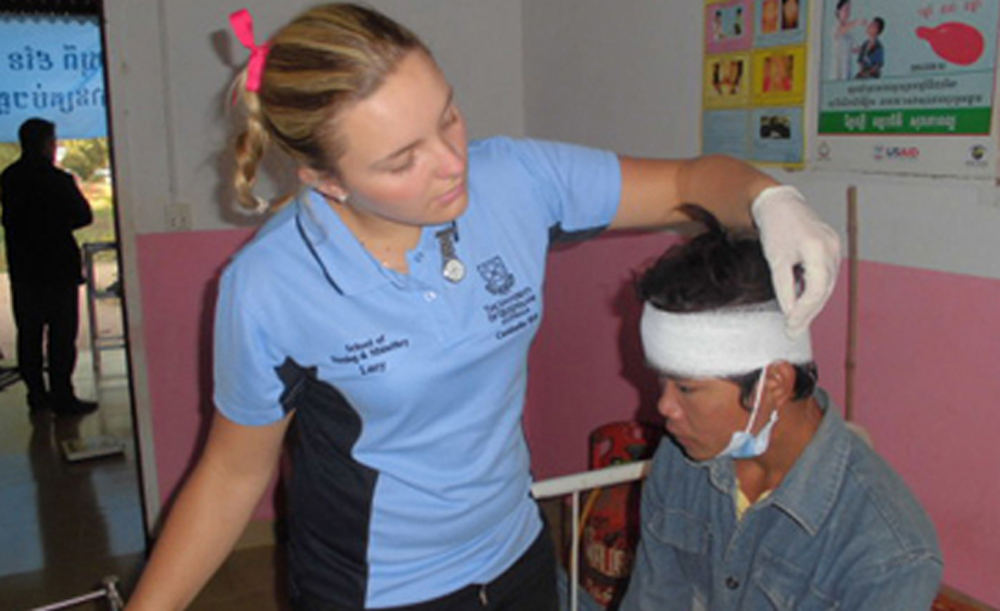Students find new career goals, enhanced perspective on four-week placement.
Nursing and midwifery students recently travelled to Cambodia to apply concepts and skills in an unfamiliar environment.
The four-week placement to Siem Reap was open to second- and third-year students at the University of Queensland and counted as credit towards their bachelor’s degrees.
School of nursing and midwifery head professor Catherine Turner said the placement gave students the chance to extend their practice and build their confidence through the need to be more self-reliant and adaptable.
She said the trip also broadened students’ perspective and enhanced communication skills.
“They experienced firsthand what it is like to not speak the local language, as students had to perform their clinical assessment and clinical interventions via an interpreter,” Turner said. “This is a very important dimension to their learning as Australia is a multicultural nation.”
Willow Durrington, who took the placement, said, “I gained a lot of self-confidence ... through assessing and diagnosing patients at the rural clinics. I was also able to develop my communication skills as we had to work through translators – something I had little previous experience with.”
She said she intends to travel the world and participate in medical aid, which led to her taking up the offer to head to Siem Reap.
“I felt that this placement would help me get a foot in the door, with experience working internationally and within a rural community,” Durrington said. “It was an eye-opening experience; I have travelled abroad before and witnessed poverty, but I have never worked within it.”
The rural clinics that were visited on a daily basis were at the frontline for health in Siem Reap. Turner said students were able to manage patients from arrival to discharge and also took part in health teaching and promotion in local communities and schools.
Students also saw how Cambodian health services made use of the resources they had. “The local clinics are not well-resourced and as a consequence the local nurses and midwives have extremely well-developed problem-solving skills,” Turner said. “Students come away with the understanding that there are many different approaches to one clinical problem.”
Prior to travelling, the group raised more than $8000 to donate to the communities they visited, allowing the purchase of necessities such as medicine, a birthing bed and a steriliser.
Turner said, “This facilitates a wider view of health for the students and assists them to see firsthand the links between health status and socioeconomic status.”
Vincent Cheah, another student who travelled to Cambodia, said the experience wasn’t what he imagined. “Going to Cambodia even with all the copious amounts of preparation and planning was like walking into a dark room with a candle,” he said.
He added that only by visiting the country and spending time with the local people, patients and professionals did he gain an understanding of the help that Cambodians needed.
Cheah said he is more confident as a nurse after the experience. “Whilst on practical there, I was able to utilise and refine the skills I have already learnt and I also gained new knowledge about nursing from my peers and clinical lecturers.
“The lessons I learnt in Cambodia have definitely given me a new perspective on nursing and I will try to apply these as I continue my studies.”
Turner said many students had expressed interest in working aboard for groups such as the World Health Organisation, the Red Cross and Médecins Sans Frontières as a result of the placement. She added others are focused on rural and remote positions in Australia, for which the Cambodia experience is also a great start.
She added that mental health nursing became an interest for some students after they saw that Cambodia was lacking in the field, whilst witnessing births in the clinics cemented midwifery as a preferred career path among others.
Cheah said the placement had indeed begun to influence his decisions and career path. Previously hesitant to work with kids, he has now said he’s inspired to pursue an elective in pediatrics after caring for many young children.
Do you have an idea for a story?Email [email protected]
 Aged Care Insite Australia's number one aged care news source
Aged Care Insite Australia's number one aged care news source

